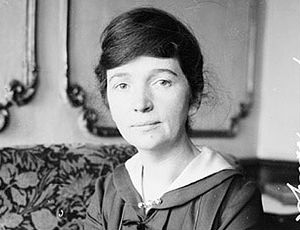Margaret Sanger came by her beliefs honestly. After watching her mother suffer through nearly 20 pregnancies and listening to her ex-Catholic father's radical speeches (often at the neighborhood watering hole), she took up the cause of women controlling their own sexuality and fertility. Ellen Feldman's biographical novel, Terrible Virtue, captures her zeal. Told mostly in Sanger's voice with addenda by those she knew, this is a sympathetic portrait of a very complicated woman. While definitely a powerhouse for the advancement of reproductive rights, Sanger sacrificed her personal life and that of those close to her to further her cause. This is a thoughtful, richly detailed book that dares you to stop reading before the end.
Sanger was the founder of Planned Parenthood and was obsessed with the idea of an effective device that women themselves could use to control their fertility without having to rely on the cooperation of men. She was introduced to Dr. Gregory Pincus, who had been working on in-vitro pregnancies in rabbits and other experiments in fertility. Mutually impressed, Pincus would go on to invent what we now know as The Pill, and Sanger would help raise the money for his research. The story of how this happened is in The Birth of the Pill, which I reviewed here.
One of Sanger's great foes was Anthony Comstock, professional prude. Sanger baited him to bring attention to the cause of reproductive rights. This was brave, because Comstock bragged that he had been responsible for the suicides of 15 people including Madame Restell, who ran an illegal contraceptive and abortion service. Renamed Madame Le Saq and reimagined by Kate Manning in My Notorious Life, this is a good companion to Terrible Virtue, and I reviewed it here.
Sanger's comrade in arms was Emma Goldman, who campaigned on a variety of issues and was considered the most dangerous woman in America by Theodore Roosevelt. Sharon Rudahl has written a graphic biography of her titled A Dangerous Woman. Using swirling pencils, Rudahl captures the turbulent times and passions of Goldman.



Add a comment to: Women of Terrible Virtue